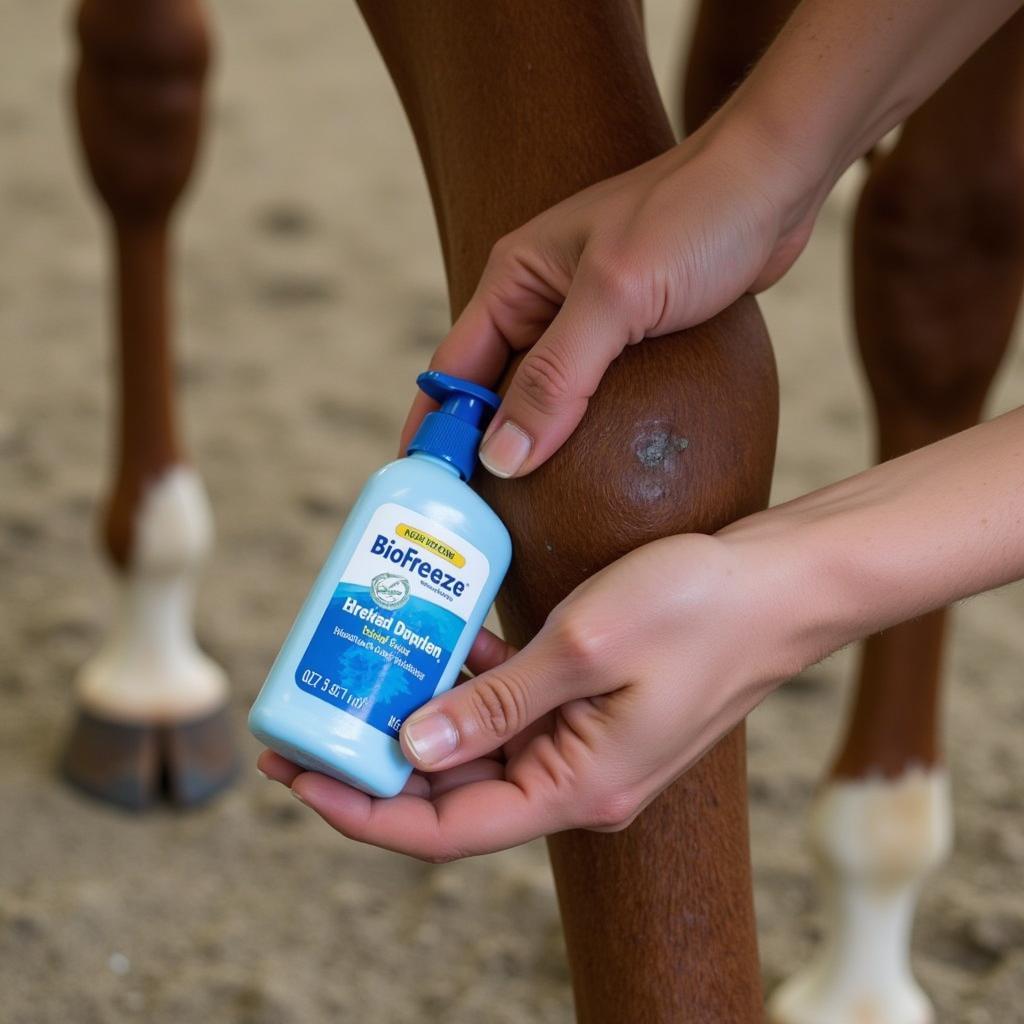Biofreeze For Horses is a popular topical pain reliever used by many horse owners to soothe their equine companions’ aches and pains. This guide dives deep into the benefits, uses, and considerations for using Biofreeze on your horse, offering valuable insights into providing effective and safe pain management.
Understanding Biofreeze and Its Ingredients
Biofreeze is a menthol-based gel that provides cooling pain relief. The primary active ingredient, menthol, creates a sensation of cold that overrides pain signals, providing temporary relief. It’s important to note that Biofreeze doesn’t heal the underlying cause of the pain but rather masks the sensation, offering comfort and allowing for greater mobility. Other ingredients often include camphor, aloe vera, and Ilex paraguariensis leaf extract, which contribute to its soothing and anti-inflammatory properties.
When to Use Biofreeze for Horses
Biofreeze can be a useful tool for managing a variety of equine ailments, including:
- Muscle soreness and stiffness: From strenuous workouts to minor injuries, Biofreeze can ease muscle discomfort.
- Joint pain: Biofreeze can provide temporary relief from arthritic pain and inflammation.
- Back pain: Horses susceptible to back pain may benefit from Biofreeze’s soothing properties.
- Tendon and ligament strains: Biofreeze can help reduce inflammation and pain associated with soft tissue injuries.
 Applying Biofreeze Gel on a Horse's Leg
Applying Biofreeze Gel on a Horse's Leg
Applying Biofreeze to Your Horse: A Step-by-Step Guide
- Clean the area: Before applying Biofreeze, ensure the area is clean and dry.
- Apply a small amount: Start with a small amount of gel and gently rub it into the affected area.
- Avoid sensitive areas: Do not apply Biofreeze to open wounds, mucous membranes, or near the eyes.
- Monitor your horse: Observe your horse’s reaction to Biofreeze. If any irritation occurs, discontinue use.
- Wash your hands: After applying Biofreeze, thoroughly wash your hands.
Precautions and Considerations
While Biofreeze is generally considered safe for horses, certain precautions should be taken. Avoid using Biofreeze on horses with known sensitivities to menthol or other ingredients. Always consult your veterinarian before using Biofreeze on pregnant or lactating mares, or on horses with underlying medical conditions. Never use Biofreeze under bandages or wraps, as this can trap heat and potentially cause burns.
 Veterinarian Examining a Horse's Leg
Veterinarian Examining a Horse's Leg
Biofreeze vs. Other Pain Relief Options for Horses
Biofreeze offers a convenient and non-invasive way to manage minor pain in horses. However, it’s important to understand its limitations. For more severe injuries or chronic conditions, it’s essential to consult your veterinarian for a proper diagnosis and treatment plan. Other pain relief options for horses may include non-steroidal anti-inflammatory drugs (NSAIDs), corticosteroids, and other therapies such as acupuncture or chiropractic care.
Is Biofreeze Right for Your Horse?
Determining whether Biofreeze is the right pain relief option for your horse depends on the specific situation. For minor aches and pains, Biofreeze can offer quick and effective relief. However, it’s crucial to remember that Biofreeze is not a substitute for veterinary care.
 Horse Grazing Pain-Free in a Pasture
Horse Grazing Pain-Free in a Pasture
Conclusion
Biofreeze for horses can be a valuable tool in your equine first-aid kit. When used appropriately, it can provide temporary pain relief for a variety of conditions. However, always consult with your veterinarian before using Biofreeze, especially if your horse has any underlying health issues. Remember, Biofreeze addresses the symptoms, not the cause of pain. A proper veterinary diagnosis is essential for effective long-term pain management.
FAQ
- Can I use human Biofreeze on my horse? While the ingredients are similar, it’s best to use products specifically formulated for horses.
- How long does Biofreeze last on a horse? The effects of Biofreeze typically last for several hours.
- Can Biofreeze be used on open wounds? No, Biofreeze should never be applied to open wounds or irritated skin.
- Can I use Biofreeze under bandages? No, avoid using Biofreeze under bandages, as this can trap heat and cause irritation.
- What should I do if my horse has an allergic reaction to Biofreeze? Discontinue use immediately and contact your veterinarian.
- Is Biofreeze a cure for arthritis in horses? No, Biofreeze provides temporary pain relief but does not cure or treat the underlying cause of arthritis.
- Can I use Biofreeze before riding my horse? Yes, Biofreeze can be applied before riding to help alleviate existing discomfort and potentially prevent further soreness.
Related Articles on Justus Horses USA:
- Equine First Aid Essentials
- Understanding Equine Arthritis
- Common Horse Injuries and Treatments
For further assistance, please contact us: Phone: 0772127271, Email: [email protected] or visit us at QGM2+WX2, Vị Trung, Vị Thuỷ, Hậu Giang, Việt Nam. We have a 24/7 customer support team ready to help.